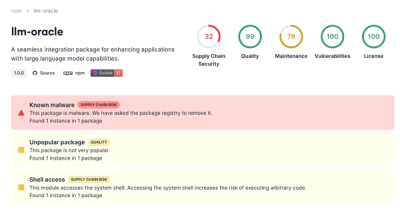
Security News
Python Overtakes JavaScript as Top Programming Language on GitHub
Python becomes GitHub's top language in 2024, driven by AI and data science projects, while AI-powered security tools are gaining adoption.
@arthurgeron/eslint-plugin-react-usememo
Advanced tools
Enforce that functions or complex objects that can generate unecessary renders or side-effects are wrapped in `useMemo` or `useCallback`, allow for devs to enforce that functional components be wrapped in `memo` programatically, and that all props and dep
Enforce that functions or complex objects that can generate unecessary renders or side-effects are wrapped in useMemo or useCallback, allow for devs to enforce that functional components be wrapped in memo programatically, and that all props and deps are wrapped in useMemo/useCallback; The intended outcome is that component's tree and/or expensive lifecycles (e.g. React Native's FlatLists, useEffect, useMemo, etc) only re-calculate or render again when really necessary, controlling expensive expressions and bringing out the best scalability and performance that your application can get.
React Native's own docs state how it's important to use static or memoized as props for complex children (FlatList on that case), that applies even more broadly when we are talking about custom components (the Components you've created), it might not seem necessary at first but you'll be making a bet that the component in question will never grow to use memo or those props in hooks (i.e. useEffect, useMemo, useCallback), you'll only notice once your solution starts freezing and dropping frames, that's why using the require-usememo rule is recommended.
yarn add @arthurgeron/eslint-plugin-react-usememo --dev
or
npm install @arthurgeron/eslint-plugin-react-usememo --save-dev
To enable the plugin add the following to the plugin property your eslintrc file:
"plugins": ["@arthurgeron/react-usememo"],
Then enable any rules as you like, example:
"rules": {
"@arthurgeron/react-usememo/require-usememo": [2],
},
require-usememo RecommendedRequires complex values (objects, arrays, functions, and JSX) that get passed props or referenced as a hook dependency to be wrapped in React.useMemo() or React.useCallback().
Options:
{strict: true}: Fails even in cases where it is difficult to determine if the value in question is a primitive (string or number) or a complex value (object, array, etc.);
{checkHookReturnObject: true}: Will require Object Expressions passed in return statements (e.g. return {someFunc}) to also be memoised (e.g. return useMemo(() => ({someFunc}), [someFunc])); Disabled by default;
{checkHookCalls: true}: Will require objects/data passed to a non-native/Custom hook to be memoized (e.g. in this code const data = useParse(unparsedData) it will check unparsedData for memo status), this check can be ignored by a hook/name basis, check next item for details; Enabled by default;
{ignoredHookCallsNames: Record<string, boolean>}: You can add specific hooks names here, individually disabling or enabling them to be checked when used, e.g. if you have a custom hook named useX and it should be called with unmemoized parameters you can set { ignoredHookCallsNames: { useX: false } } and then have somethning like const data = {}; const x = useX(data); not generate any errors.
function Component() {
const [data, setData] = useState([]);
// This will be redeclared each render
function renderItem({ item }) {
return (<Text>item.name</Text>);
}
// Data isn't redeclared each ender but `[]` is
return (<FlatList renderItem={renderItem} data={data ?? []} />);
}
// Has no dynamic dependencies therefore should be static, will be declared only once.
function renderItem({ item }) {
return <Text>item.name</Text>;
}
const EMPTY_ARRAY = [];
function Component() {
const [data, setData] = useState(EMPTY_ARRAY);
// Will only render again if data changes
return (<FlatList renderItem={renderItem} data={data ?? EMPTY_ARRAY} />);
}
class Component() {
constructor(props) {
super(props);
this.state = {
data: undefined,
propDrivenData: props.,
};
}
// This will NOT be redeclared each render
getItemName(item) {
return item.name;
}
render() {
// This function will be redeclared each render
function renderItem({ item }) {
return (<Text>{this.getItemName(item)}</Text>);
}
// Data isn't redeclared each ender but [] is
// Extradata has a exponential complexity (will iterate the entire array for each render, could render once or several times in a second)
// Outcome will be that any new render on this component will cause the entire FlatList to render again, including children components, even if the data hasn't changed.
return (<FlatList
renderItem={renderItem}
data={data ?? []}
extraData={dataArray.filter(id => !!id)}
/>);
}
}
In the previous example there are two issues, a function and a object that will be dynamically redeclared each time the component renders, which will cause FlatList to keep re-rendering even when the input data hasn't changed.
// Static therefore is only declared once
const EMPTY_ARRAY = [];
class Component() {
constructor(props) {
super(props);
this.state = {
data: undefined,
propDrivenData: props.dataArray.filter(id => !!id),
};
}
// Properly regenerate state driven data only when props change instead of during each render
static getDerivedStateFromProps(props) {
if (props.propDrivenData !== this.props.propDrivenData) {
return {
propDrivenData: props.dataArray.filter(id => !!id),
};
}
return null;
}
// Will be declared only once.
getItemName({item}) {
const { data } = this.state;
const dataLength = data ? data.length : 0;
return (<Text>{item.name} {dataLength}</Text>);
}
render() {
const { data } = this.state;
// Will only cause a new render if data changes
return (<FlatList renderItem={this.renderItem} data={data ?? EMPTY_ARRAY} />);
}
}
const EMPTY_ARRAY = [];
function Component() {
const [data, setData] = useState(EMPTY_ARRAY);
const [isEditing, setIsEditing] = useState(false);
// Has dynamic dependencies but will only be re-declared when isEditing or the input data changes
const renderItem = useCallback(({ item }) => {
return (<Text>{isEditing ? 'item.name' : 'Editing'}</Text>);
}, [isEditing]);
return (<FlatList renderItem={renderItem} data={data ?? EMPTY_ARRAY} />);
}
Hooks return statements follow the same motto, they can and usually are used inside other hooks.
function useData() {
let otherData = {};
function getData() {}
return { getData, otherData};
}
function getData() {}
function useData() {
return { getData };
}
function doSomething() {}
function useStateManagement(someFlag) {
useEffect(() => {
doSomething(someFlag);
}, [someFlag]);
}
function useData() {
const someFlag = {};
// Some flag is memoized, so not unwanted side effects are generated in the other hook
const data = useStateManagement(someFlag);
}
const otherData = {}; // Or declare inside hook with useMemo
function useData() {
const getData = useCallback(() => { // Or declare statically
}, []);
return {getData, otherData};
}
function getData() {
// Doing something
}
function useData() {
return useMemo(() => ({ getData }), []);
}
function getData() {}
function useData() {
return useMemo(() => ({ getData }), []);
}
function doSomething() {}
function useStateManagement(someFlag) {
useEffect(() => {
doSomething(someFlag);
}, [someFlag]);
}
function useData() {
const someFlag = useMemo(() => ({}), []);
// Some flag is memoized, so not unwanted side effects are generated in the other hook
const data = useStateManagement(someFlag);
}
function doSomething() {
}
function useStateManagement(someFlag) {
useEffect(() => {
doSomething(someFlag);
}, [someFlag]);
}
function useData() {
const someFlag = useMemo(() => ({}), []);
// Some flag is regenerated each render, hence useEffect in "useStateManagement" will execute a new cycle each render
// Either way this will not generate a error/warning because of the options passed
const data = useStateManagement(someFlag);
}
require-memoRequires all function components to be wrapped in React.memo().
May be useful when used with overrides in your eslint config, I do not recommend enabling this globally, while there's great advantaje in memoing a complex tree of components some smaller/basic components with no children might not need to be memoized.
export default function Component() {
return (<Text>This is a component</Text>);
}
export default memo(function Component() {
return (<Text>This is a component</Text>);
});
require-usememo-children AdvancedRequires complex values (objects, arrays, functions, and JSX) that get passed as children to be wrapped in React.useMemo() or React.useCallback().
Options:
{strict: true}: Fails even in cases where it is difficult to determine if the value in question is a primitive (string or number) or a complex value (object, array, etc.). function Component() {
return (<View>
<>
<OtherComponent />
</>
</View>);
}
function Component() {
const children = useMemo(() => (<OtherComponent />), []);
return (<View>
{children}
</View>);
}
FAQs
This plugin enforces the wrapping of complex objects or functions (which might generate unnecessary renders or side-effects) in `useMemo` or `useCallback`. It also allows you to programmatically enforce the wrapping of functional components in `memo`, and
The npm package @arthurgeron/eslint-plugin-react-usememo receives a total of 2,704 weekly downloads. As such, @arthurgeron/eslint-plugin-react-usememo popularity was classified as popular.
We found that @arthurgeron/eslint-plugin-react-usememo demonstrated a healthy version release cadence and project activity because the last version was released less than a year ago. It has 0 open source maintainers collaborating on the project.
Did you know?

Socket for GitHub automatically highlights issues in each pull request and monitors the health of all your open source dependencies. Discover the contents of your packages and block harmful activity before you install or update your dependencies.

Security News
Python becomes GitHub's top language in 2024, driven by AI and data science projects, while AI-powered security tools are gaining adoption.

Security News
Dutch National Police and FBI dismantle Redline and Meta infostealer malware-as-a-service operations in Operation Magnus, seizing servers and source code.

Research
Security News
Socket is tracking a new trend where malicious actors are now exploiting the popularity of LLM research to spread malware through seemingly useful open source packages.